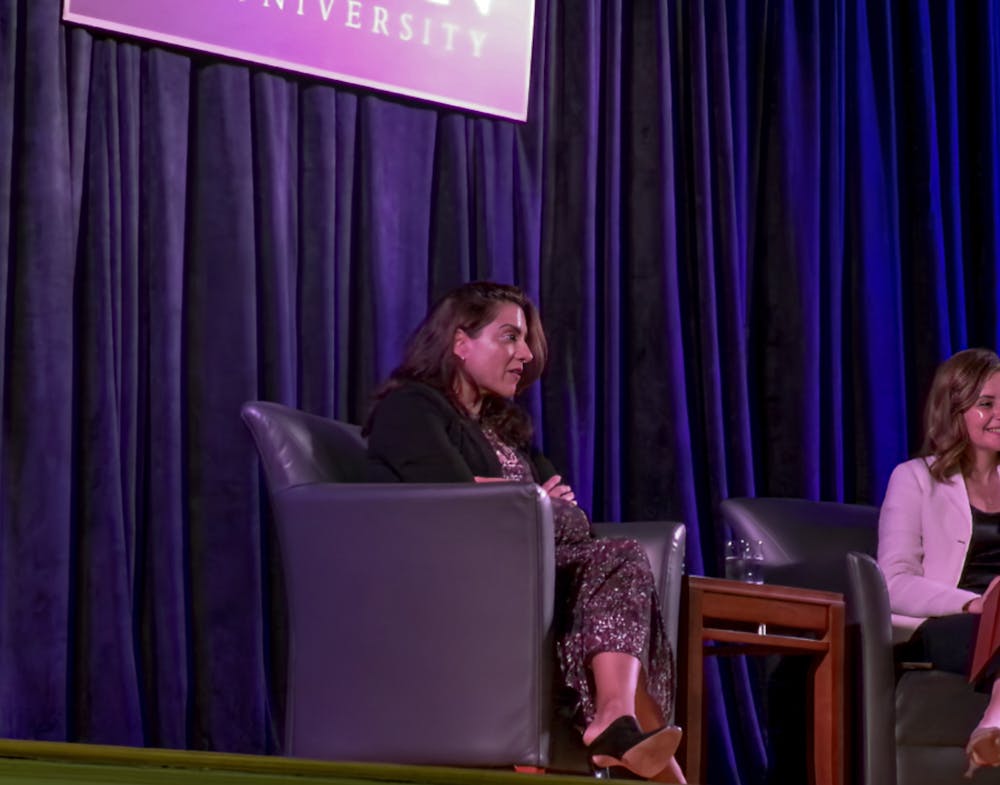When sophomore Anna Mustanski tells people her major is computer science, she said they’re often surprised.
“I’ve actually had quite a few female professors for my STEM and computer science classes, and they seem excited when they have women in their classes,” Mustanksi said.
Mustanksi described women in computer science as a small but close community on campus, as it’s one of the most male-dominated majors in the U.S. — with less than 20% women, according to the National Science Foundation. Efforts have been made to bridge the gender gap, including an organization called Girls Who Code, which encourages women to pursue coding through education programs and the distribution of books.
Reshma Saujani, founder of Girls Who Code, spoke in McKinnon Hall at Elon University on Oct. 24. She is a lawyer, author, activist and founder and CEO of Moms First — her most recent endeavor that seeks to provide more employment benefits and childcare for mothers. Saujani also said she is an advocate for equal pay between men and women. In her presentation, she said her background with two refugee parents played a pivotal role in her activism.
“I’ve pretty much been an activist my whole life,” Saujani said. “I think being born the daughter of immigrants — the daughter of refugees — made a huge impact on me. It solidified who I wanted to serve.”
Saujani said her work has been focused on underserved communities, especially women. Her mission is to level the gender wage gap, provide a better care system for mothers and integrate more women in male-dominated fields.
Saujani described a cultural outlook that pushed women away from computer science careers.
“The tech population went from 40 to 42% female to what it is today, which is less than 19%,” Saujani said. “You had this whole cultural element where all of the sudden you had Barbie dolls that said ‘I hate math, let’s go shopping instead.’”
Saujani encouraged women in the audience to try and fail rather than not try at all. Part of the efforts by Girls Who Code includes teaching women to strive for bravery over perfection.
“The implications of perfectionism are enormous on every aspect of our life,” Saujani said. “If we’re waiting to be perfect to lead, to live, we’ll never close the leadership gap.”
Saujani said failure in her own life has shaped who she is today, most notably having run and lost in two elections for public office. She said her platform was to bring computer science to students in New York City.
“I walked out of those races saying ‘Okay, you don’t like me? Well I’m going to teach every kid in America how to code,’” Saujani said.
According to Saujani, Girls Who Code has served close to 600,000 students as of 2022.
While the audience of approximately 80 people was mostly women, Saujani addressed the men in the audience and said they should be conscious of and patient to speak when women are around in professional settings.
“It just takes women a little more time to be brave, so count to 100,” Saujani said. “Count to 100 before you raise your hand.”
Saujani encouraged the audience to get involved in the women in tech movement and start initiatives from the ground up. Students, including freshman Silvia Gusmati, expressed their own difficulties with women’s rights in politics.
“I feel like no matter how many times I go to the steps of our Capitol, I’m still not being heard,” said Gusmati.
Saujani said social justice is not just about protesting but rather requires more actions and conversations. She said she has hope for the future.
“We’re in good hands,” Saujani said. “This generation is just remarkable.”
Mustanski said she also feels a strong connection to her generation of women in tech at Elon.
“We have a women in STEM organization here at Elon, as well as a STEM LLC,” Mustanski said. “While women in computer science is a small community, it gives us something to bond over."


